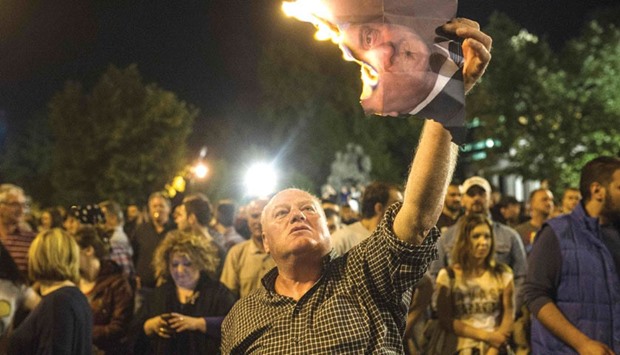
A protester burns a photo of Macedonia’s president in Skopje late on Wednesday.
Macedonia’s special prosecutor said yesterday that she would continue investigating a wiretapping scandal, including alleged large-scale misappropriation of government funds, despite 56 officials being granted a presidential amnesty.
Prosecutors said they had not been consulted about President Gjorge Ivanov’s decision, first announced on Tuesday, to pardon prominent politicians alleged to be involved in the affair, including former prime minister Nikola Gruevski and opposition leader Zoran Zaev.
“I am firmly convinced that justice will prevail. We will continue to work according to the law by which this office was established,” said special prosecutor Katica Janeva, who was appointed last year to investigate the scandal.
Janeva, speaking at a news conference attended by ambassadors from European Union countries, said her office had information that a large amount of money from the state budget had ended up in private pockets between 2008 and 2015.
Although the pardons prevent her from bringing charges against any of the 56 officials, Janeva said her office would keep investigating whether wealth had been taken illegally and, if so, seek to confiscate it.
Ivanov’s decision to pardon the government and opposition figures drew protests at home and abroad, with the United States warning it could protect “corrupt politicians”.
Britain’s Europe Minister David Lidington said yesterday that Ivanov’s pardon was a “matter of considerable concern” and he urged him “to find a way to reverse the decision”.
The Organisation for Security and Co-operation in Europe, the continent’s main security and rights watchdog, said that the Macedonian judiciary and special prosecutor’s office “must be allowed to continue to do their very important work”.
Protesters wrecked one of Ivanov’s offices in the Macedonian capital Skopje on Wednesday night and another demonstration was planned for yesterday evening after Zaev called for peaceful protests. Some opposition supporters set up tents in front of parliament.
Macedonia, a poor Balkan country of 2mn people on the frontline of Europe’s refugee crisis, has been in turmoil since Zaev accused Gruevski and his counter-intelligence chief, Saso Mijalkov, in February last year of orchestrating the wiretapping of more than 20,000 people.
The opposition said the phone-taps exposed government control over journalists, judges, public sector recruitment and the manipulation of elections in Macedonia, which aspires to join the EU and Nato.
Under an EU-brokered deal reached last year to try to end the crisis, a special prosecutor was appointed to investigate the wiretap revelations and Gruevski agreed to an early election, expected in June.
Gruevski distanced himself yesterday from Ivanov’s amnesty.
“It is against what we stand for. Those who have done something criminal should answer for it,” he said.
